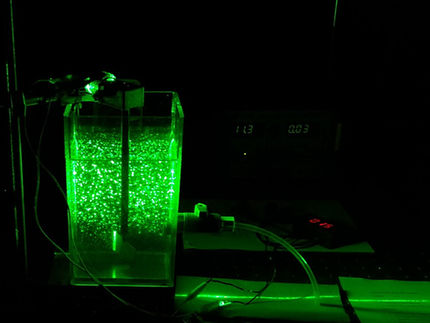Researchers develop a new material that removes a dangerous “forever chemical,” from drinking water
Powerful technology can detect and filter out chemical linked to cancer and other health risks, potentially revolutionizing water purification efforts
Researchers at NYU Abu Dhabi (NYUAD) have developed an innovative cationic covalent organic framework (COF) that efficiently detects and removes perfluorooctanoic acid (PFOA), a harmful and persistent pollutant, from drinking water. This breakthrough addresses a global challenge of removing perfluorinated alkylated substances (PFAS), or “forever chemicals”, which raised environmental and health concerns due to their accumulation in water and links to severe health risks, including cancer and developmental issues.

Asmaa Jrad, Postdoctoral Research Associate - Ali Trabolsi, Professor of Chemistry - Gobinda Das, Research Associate
NYU Abu Dhabi
The synthesized COF material developed at NYUAD Trabolsi Research Group is capable of detecting and removing PFAS from water quickly and efficiently at environmentally relevant concentrations, offering a promising solution beyond traditional treatment methods that struggle to remove PFAS. This material could be incorporated into household water filters, boosting the performance of conventional materials, which allows for practical and scalable applications worldwide.
The findings are published in Nature Communications in a study entitled Cationic Covalent Organic Framework for the Fluorescent Sensing and Cooperative Adsorption of Perfluorooctanoic Acid. Through a simple sonochemical method, the researchers developed a COF that optimized both hydrophobic and electrostatic interactions and had an abundance of adsorption sites to maximize interactions with PFAS molecules. This allowed the COFs to detect and remove PFOA within seconds, even at environmentally relevant concentrations. The researchers then investigated the mechanisms underlying both detection and rapid removal through computer simulations, providing insights into its interactions at the atomic level and serving as a valuable guide for further research in this field.
“This breakthrough, offering a faster, more efficient solution than existing technologies, has the potential to transform water purification and greatly improve water quality around the world,” said Ali Trabolsi, NYUAD professor of chemistry and Co-PI at the NYUAD Water Research Center who led this work with his team, including Postdoctoral Research Associate Asmaa Jrad and Research Associate Gobinda Das. “With the prevalence of ‘forever chemicals’ in our environment and bloodstreams posing a significant danger to human health, this new technology is both timely and essential.”
In recognition of the impact of this research, Jrad was named a 2023 MIT Innovator Under 35, highlighting the innovation's significance. The team hopes this project will raise awareness of PFAS risks in the UAE and globally, advocating for increased PFAS monitoring and safety standards.
Original publication
Asmaa Jrad, Gobinda Das, Nour Alkhatib, Thirumurugan Prakasam, Farah Benyettou, Sabu Varghese, Felipe Gándara, Mark Olson, Serdal Kirmizialtin, Ali Trabolsi; "Cationic covalent organic framework for the fluorescent sensing and cooperative adsorption of perfluorooctanoic acid"; Nature Communications, Volume 15, 2024-12-2
Original publication
Asmaa Jrad, Gobinda Das, Nour Alkhatib, Thirumurugan Prakasam, Farah Benyettou, Sabu Varghese, Felipe Gándara, Mark Olson, Serdal Kirmizialtin, Ali Trabolsi; "Cationic covalent organic framework for the fluorescent sensing and cooperative adsorption of perfluorooctanoic acid"; Nature Communications, Volume 15, 2024-12-2
Topics
Organizations
Other news from the department science

Get the chemical industry in your inbox
By submitting this form you agree that LUMITOS AG will send you the newsletter(s) selected above by email. Your data will not be passed on to third parties. Your data will be stored and processed in accordance with our data protection regulations. LUMITOS may contact you by email for the purpose of advertising or market and opinion surveys. You can revoke your consent at any time without giving reasons to LUMITOS AG, Ernst-Augustin-Str. 2, 12489 Berlin, Germany or by e-mail at revoke@lumitos.com with effect for the future. In addition, each email contains a link to unsubscribe from the corresponding newsletter.




























































